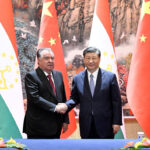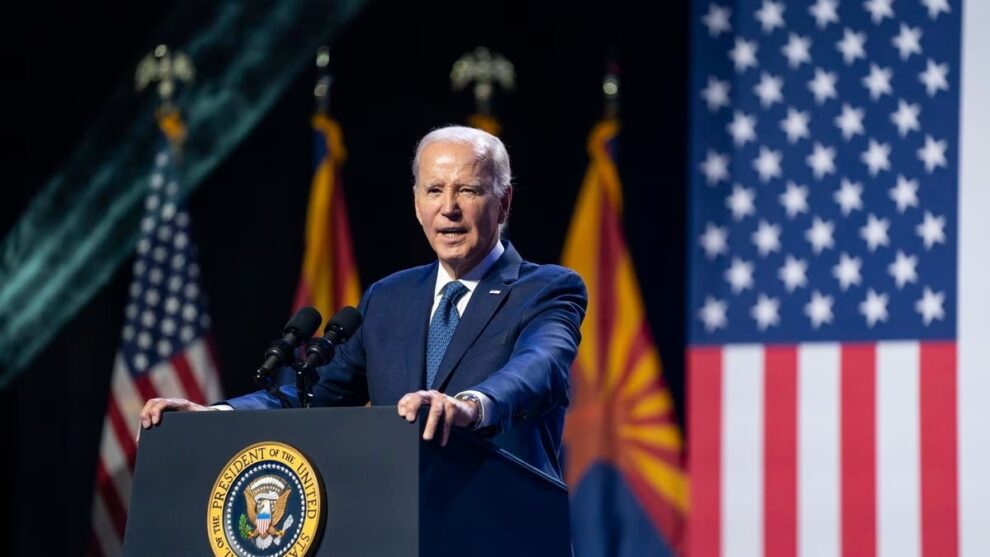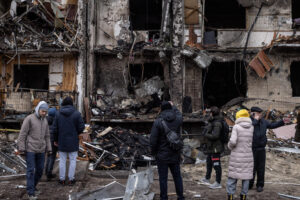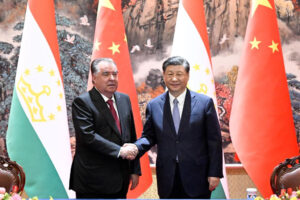WASHINGTON (AP) — President Joe Biden gathered other world powers Tuesday to coordinate on Ukraine as it battles Russia in a war now almost 20 months long — a deliberate show of U.S. support at a time when the future of its aid is entangled with a volatile faction of House Republicans who want to cut off money to Kyiv.
The phone call — convened by the United States and joined by key allies in Europe as well as the leaders of Canada and Japan — was held three days after Biden signed legislation hastily sent to him by Congress that kept the federal government funded but left off billions in funding for Ukraine’s war effort that the White House had vigorously backed.
All the countries that participated in the call stressed that their backing of Ukraine remains unchanged, and no one questioned whether U.S. support of Kyiv was in doubt, according to the White House. But the administration sternly warned Tuesday that Congress must not let the flow of aid be disrupted, lest Russian President Vladimir Putin exploit any lapses to his advantage.
“Time is not our friend,” said John Kirby, the spokesman for the National Security Council at the White House. He warned that any gaps in U.S. support “will make Putin believe he can wait us out.”
Kirby said the current tranche of congressionally-approved U.S. aid would be enough to help Ukraine for another “couple of weeks” or a “couple of months,” although the precise estimate would hinge on current battlefield conditions.
The outlook for the future of Ukraine aid has been murky at best after Biden on Saturday signed a bill to fund U.S. government operations through mid-November that ignored the billions in additional funds for Kyiv requested by Biden in late August. The president, as well as congressional Democratic leaders, had stressed after the vote that they had expected then-House Speaker Kevin McCarthy to follow through on his public commitment to Ukraine aid even as Republican resistance to it continues.
Biden went as far as to imply that e had a deal with McCarthy to move Ukraine aid once the government was funded, although the speaker has denied that is the case and the White House has refused to elaborate on the president’s remarks. Meanwhile, McCarthy signaled over the weekend that he supports linking new Ukraine funding to security improvements at the U.S. border with Mexico. Kirby said Tuesday that the White House supports both issues on their own merits but not tied together.
McCarthy was ejected from his own job on Tuesday in dramatic fashion on the House floor. Even as the White House said it was staying out of his fight to keep the speaker’s gavel, Kirby emphasized that other House GOP leaders support Ukraine aid, not just McCarthy himself.
In Poland, President Andrzej Duda said after the call that Biden had assured the group of continued U.S. support for Ukraine and of his strong conviction that Congress will not walk away.
“Everyone took the floor. The main subject was Ukraine, the situation in Ukraine,” Duda said at a news conference in Kielce, Poland. “President Joe Biden began with telling us about the situation in the U.S. and what is the real political situation around Ukraine. He assured us that there is backing for the continuing support for Ukraine, first of all for the military support. He said that he will get that backing in the Congress.”
Duda said Biden assured the leaders that support for Ukraine in the U.S. Congress is much broader than media reports suggest. He said Biden called on the participants to continue their support for Ukraine and that everyone assured him that they would.
Kirby added that the other leaders weren’t concerned about whether U.S. would stop backing Ukraine: “They understand what’s going up on Capitol Hill,” he said.
Others on the call included the leaders of Canada, Germany, Italy, Japan, Romania, Britain, the European Commission and the European Council. France’s foreign minister also participated, the White House said. French President Emmanuel Macron was not available due to scheduling issues, according to a U.S. administration official.
The group also discussed how to provide Ukraine with the weapons support and strengthen its air defenses, as well as shoring up its energy infrastructure as the nation girds for a cold winter. The leaders also strategized on how to marshal private donations to aid Ukraine’s economic recovery, according to a White House readout of the call.
“Everyone was saying that this is the next step that will be necessary and for which preparations should begin now,” Duda said of the leaders’ discussion on helping to rebuild Ukraine.
As the White House made its case for continued aid to Ukraine, lawmakers and military veterans rallied outside the U.S. Capitol to make their own call to keep up the funding. Many argued stopping U.S. support to Ukraine would embolden Russia and other rivals to invade other democratic allies after Ukraine, and draw U.S. forces into direct conflict.
Retired Brig. Gen. Mark Arnold, a veteran of the special forces, told the crowd that “the world is watching this debate about abandoning Ukraine.”
“Retreats to isolationism do not work,” Arnold said. China and Russia and other adversaries “will all rise in strength if Ukraine is defeated.”
The exclusion of money for Ukraine came little more than a week after lawmakers met in the Capitol with Ukrainian President Volodymyr Zelenskyy. He sought to assure them that his military was winning the war, but stressed that additional assistance would be crucial.
Voting in the House last week pointed to the potential trouble ahead. Nearly half of House Republicans voted to cut from a defense spending bill $300 million to train Ukrainian soldiers and buy weapons. The money later was approved separately, but opponents of Ukraine support celebrated their growing numbers.
The U.S. has approved four rounds of aid to Ukraine in response to Russia’s invasion, totaling about $113 billion, with some of that money going toward replenishment of U.S. military equipment that was sent to the front lines. In August, Biden called on Congress to provide for an additional $24 billion.
Source: AP











